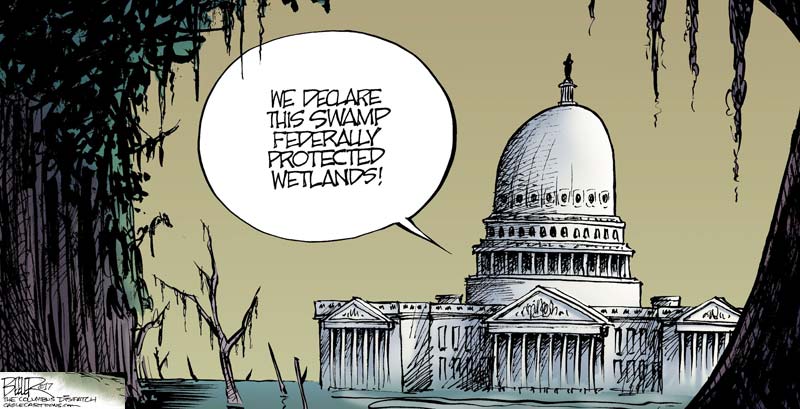
The case of former Obama administration cybersecurity official Samir Jain has sparked a reaction from lawmakers who see his new gig as a lobbyist for Huawei as problematic. After the news broke last month that Jain, who served as National Security Council senior director for cybersecurity policy in the Obama White House, had registered as a Huawei lobbyist, President Donald Trump tweeted: "This is not good, or acceptable!"
But the president didn't explain why Jain working for Huawei was bad. Lawmakers want to put new rules in place to restrict adversary countries - like China - from gaining access to sensitive U.S. national security information by hiring former officials.
"In recent years, the Chinese Communist Party has increasingly turned to the swamp to advance its hostile agenda," Rep. Mike Gallagher, R-Wis., told me. "We must do all we can to prevent senior government officials from shopping their connections on behalf of foreign adversaries. . . . There is a clear need for broader action."
Last month, Gallagher introduced the Congressional and Executive Foreign Lobbying Ban Act, which would prohibit former members of Congress, retired senior military officers and former senior political appointees from lobbying for foreign governments. Gallagher wrote to FBI Director Christopher A. Wray last month to inquire about Jain's security clearance status, since he is now working for Huawei.
"Mr. Jain's seniority and intimate knowledge of U.S. cyber security policy are now in the service of a state-directed company that according to recent reports has received funding from the National Security Commission of the Chinese Communist Party, the People's Liberation Army, and Chinese intelligence services," he wrote. "I am deeply concerned that his current employment may jeopardize American national security and undermine efforts by the United States to rally the international community against threats posed by Huawei."
The FBI declined to comment on the status of Jain's security clearances but pointed me to Wray's January news conference announcing the indictments of Huawei and its chief financial officer Wanzhou Meng on charges of violating U.S. sanctions on Iran and stealing U.S. technology secrets. Wray said giving information to Huawei risks giving it to the Chinese government.
"It is public record that under Chinese cybersecurity law, Chinese companies like Huawei are required to provide, essentially, access upon demand with little to no process to challenge that," Wray said. "And so that's why it creates the national security implications we are concerned about."
Congress responded to those concerns by restricting the U.S. military's use of Huawei equipment in last year's National Defense Authorization Act. Huawei responded by suing the U.S. government, using the U.S. federal court system. That's the case Huawei has now hired Jain to lobby on, according to public disclosure filings.
Jain's firm, Jones Day, has represented the Chinese Embassy in the past. According to the company's website, the law firm's close relationship with the Chinese government was established by former partner Herb Hansell and continued at least until Hansell's death in 2015. Jones Day and Jain declined to comment for this story.
As the Center for Responsive Politics reported, Jain's contract is just one part of a seven-figure Huawei lobbying and public relations campaign. Jones Day registered under the Lobbying Disclosure Act, which requires less reporting and therefore provides less transparency than registering under the Foreign Agents Registration Act (FARA).
Two public relations firms that Huawei also hired, Racepoint Global and Burson Cohn and Wolfe (BCW), registered under FARA, which is required for anyone working principally on behalf of a foreign government or its agent. The question of Huawei's connections to the Chinese government is hotly debated, but the public relations firms decided to err on the safe side, saying Huawei hasn't provided proof of its independence.
Huawei claims to be a private, independent, employee-owned corporation, but there's significant evidence that's not the case. A recent research paper sought to demystify Huawei's opaque ownership structure. Regardless, the U.S. intelligence community believes Huawei is at the very least beholden to the direction of China's national security state and at worst an arm of it.
The reason Chinese companies such as Huawei need more oversight and restriction is because they present a broader threat to U.S. economic and national security than companies from other countries. The U.S.-China Economic and Security Review Commission released a new report last week detailing how Chinese companies facilitate the transfer of sensitive technologies from U.S. firms through legal and illegal means.
"Although Chinese companies are not the only foreign firms seeking to acquire U.S. technology, the Chinese case is unique because the Chinese Communist Party (CCP) has prioritized technology transfer as a matter of policy and provides direct and indirect support to companies engaging in these anticompetitive activities," the report states.
Laws must evolve to match evolving threats. A top national security official with senior and in-depth knowledge of our government and its vulnerabilities should not be allowed to get paid to help a foreign power that is actively working to exploit those vulnerabilities. It's not illegal to help China weaken U.S. national security, but it should be.
Sign up for the daily JWR update. It's free. Just click here.
(COMMENT, BELOW)


 Contact The Editor
Contact The Editor
 Articles By This Author
Articles By This Author